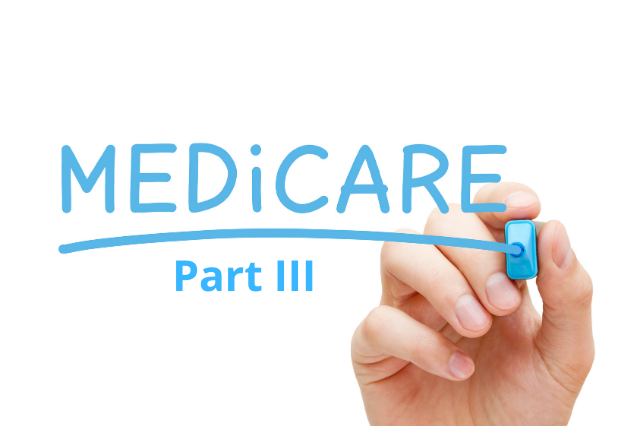Welcome back! Our Medicare amusement park ride is about to come to an end. We are pleased to present our third and final installment of our Medicare Series with insurance professional Kelly Allen at Kelly Allen Agency. Kelly is one of our strategic partners who we include in our mission to provide comprehensive, and holistic care for our clients.
Kelly has taken us and our readers on a ride delving into the top questions she hears about Medicare in an effort to bring knowledge, confidence, and empowerment to everyone this enrollment season and beyond.
Medicare can be an intimidating space, full of red tape, esoteric rules, penalties, and costs. Navigating this space properly can help ensure you are well protected and covered in your golden years. We loved our time speaking with Kelly and can’t wait to explore this final set of questions with you here today.
We are going to discuss the importance of Part D, how Medicare has adapted with COVID-19, and the top reasons healthcare planning is crucial to your retirement lifestyle. Let’s get started.
Why do you need to purchase Part D insurance?
Part D is the prescription drug component of Medicare. Prescriptions can run a hefty bill, about $1,200 per person per year according to Bloomberg which is higher than any other place in the world.
Part D is an essential component of Medicare. When you turn 65, enrolling in Part D is technically optional. You don’t have to buy a plan, but if you don’t purchase a plan and later on you decide you need it, that’s when things get complicated. If you don’t enroll in a prescription drug plan in at least 63 days after your initial enrollment, there is a penalty. The longer you wait, the bigger the penalty.
Medicare calculates the penalty at 1% of the national premium which is $32.74 in 2020. The premium is rounded to the nearest $0.10 and added to your monthly payments. Keep in mind the national average increases each year, which could bump up your penalty.
What if you don’t take any prescriptions, do you still need Part D?
A pain point for Kelly’s clients is purchasing a plan that they don’t need or won’t use for several years. But Kelly shows them that their prescription plans were never free, not even in their previous coverage. Prescription drug coverage is nearly always part of a health plan, whether you pay it as a separate line item or if it’s absorbed in the cost of the premium.
Think about it, even when you were working, your prescription coverage was dictated by your current plan. If your plan didn’t cover a certain drug, you had to pay out of pocket. The same is true for Medicare, it just comes in a different package.
It’s crucial to be prepared for anything. The last thing you want is to wait 10 years, have something happen, and be stuck with paying out of pocket for your prescription. To top it off, once you obtain coverage, you have a penalty for the rest of your life. By purchasing coverage that works for you, you’ll be covered if and when you need it.
Remember, Part D is a separate plan from Supplement and most Advantage plans. While you can find some Advantage plans with prescription coverage, it isn’t the norm.
As with most aspects of Medicare, no two Part D plans are exactly the same. You can shop around for the right plan for you. Not every plan has the same formulary (drugs it covers), so you can customize your plan based on the prescriptions you currently take and your overarching health plan.
Medicare + COVID-19
The pandemic has caused many changes in the healthcare space. Testing is considered a preventative measure and is covered by Medicare. If you are concerned about COVID-19 and you are currently enrolled in Medicare, check with your current plan provider for more in-depth details on what is and is not covered.
Why your healthcare coverage matters
Healthcare is among the most expensive line item in a retirees budget, nearly 15%. Fidelity estimates that a healthy couple will spend upwards of $295,000 in medical costs alone throughout retirement, excluding long-term care. This high figure makes it imperative that you choose a plan that will work for you throughout each stage of retirement.
As you continue in retirement, your health will likely change and that is okay. Being prepared for the change with proper savings and risk management will give you the confidence to live the best retirement life you can.
We would like to thank Kelly Allen for her foremost knowledge. Her insights made writing this article engaging and enjoyable. If you are looking for the right Medicare plan for you, please consider working with Kelly. She will be able to take a comprehensive look at your needs and help find you the right plan. Here is her contact information if interested. Get in touch with her today!
Our team at TFS loves to bring you content that is meaningful to you and your life. If you have questions about how your health fits into your retirement plan, schedule a call with our team today.
Disclosure:
This information is being offered to you as a courtesy. It is not a recommendation of Kelly Allen or Kelly Allen Agency. As with matters of this nature, you should consider all of your options prior to engaging the services of any insurance professional.
Kelly Allen and Kelly Allen Agency are not affiliated with FSC Securities Corporation.
